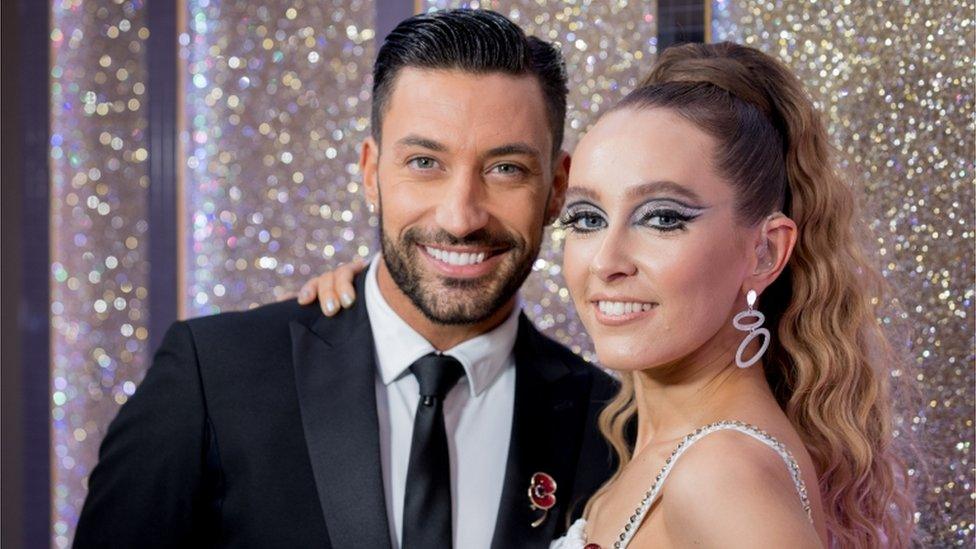'Am I the only one with hearing aids and alopecia?'
- Published
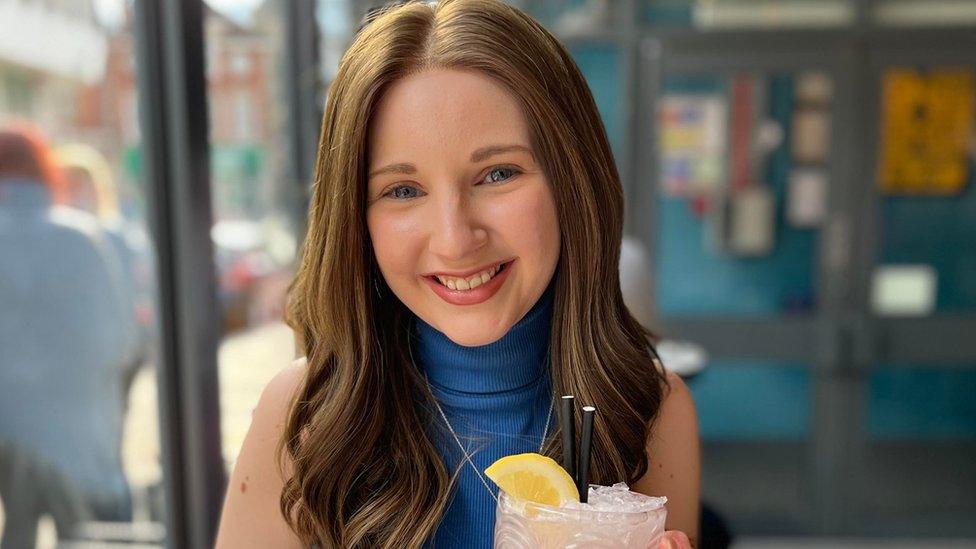
Grace wants to try a range of different coloured wigs
Grace Davies-Friend has been deaf since she was 18 months old following a complication with chemotherapy for childhood cancer. She has overcome many challenges but recently faced one of her biggest yet after developing alopecia. She is looking for others on the same journey as her.
"This is a hearing world," Grace Davies-Friend sings to the tune of James Brown's classic "It's a Man's Man's World".
Grace, 22, was a baby when she underwent chemotherapy which made the hairs in her ears that pick up sound vibrations fall out.
It caused bilateral high frequency hearing loss, which is when both ears are unable to hear high-pitched sounds, for example, when someone whistles. Grace also has moderate hearing loss for normal frequencies.
"I adapted my whole life, and went above and beyond, trying to prove that I was "normal"," she says.
"There was no way I was having people thinking I was weak."
That determination has seen her falling in love with music with a heavy bass because she can feel it, dancing by listening to a track's vibrations and training as a primary school teacher.
But over the last two years, Grace has had to adapt her life once again, after developing alopecia.
Doctors have told her it could be caused by thyroid issues, but at the moment, she has no idea why her hair started falling out.
"It has progressed since I shaved it, now to my eyebrows. I am sort of mourning my hair," she says.
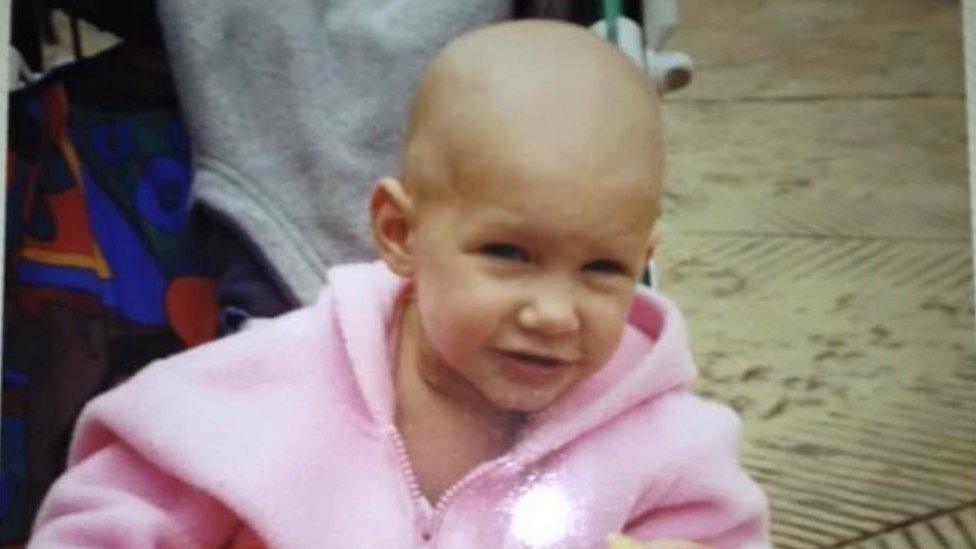
The 22-year-old says she "grew up in hospitals", losing her hair as a child while having chemotherapy
Grace, from Shrewsbury, was nine months old when her parents noticed a lump on the side of her body.
"I wasn't a particular sick child, I might have looked a bit pale," she tells the BBC.
Within hours of being seen by a doctor she was at Birmingham Children's Hospital where consultants diagnosed her with Neuroblastoma, a rare form of childhood cancer.
It was a drug called Cisplatin that led to the hair loss inside her ears when she was 18 months old.
In the months that followed, there were a few hints she was struggling with her hearing.
"I used to grab people's faces and turn them towards me because I was lip reading before I even knew what it was," she says.
Grace got her first hearing aids aged three.
"Hearing loss is more of a common side effect of chemotherapy than people think," she says.
"People think you're just going to lose the hair on your head but they don't even know that you have hair inside your ears."
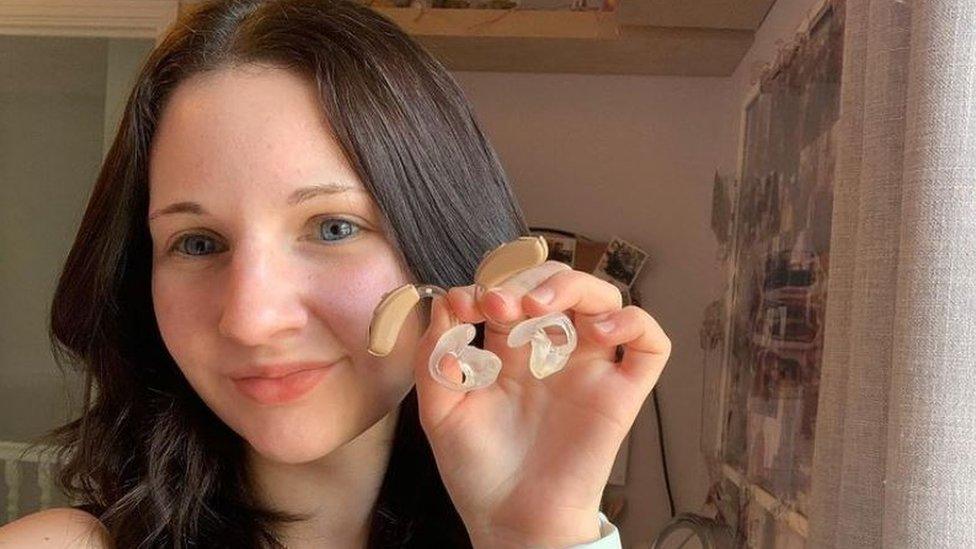
Grace Davies-Friend has bilateral high frequency hearing loss
Grace grew up "in denial" about being deaf and relied on lip reading and her hearing aids.
"The biggest regret I have is not learning how to sign as a child," she says. Grace eventually learnt when she was 18.
That denial Grace felt continued when she began to lose her hair in 2020.
While the nation posted photographs of their out-of-control lockdown hair on social media, Grace says hers "just stopped growing".
Initially it began to thin and fall out at the base of her head, which she hid at first with hair extensions.
It was when she began losing it on the top of her head she decided to shave it.
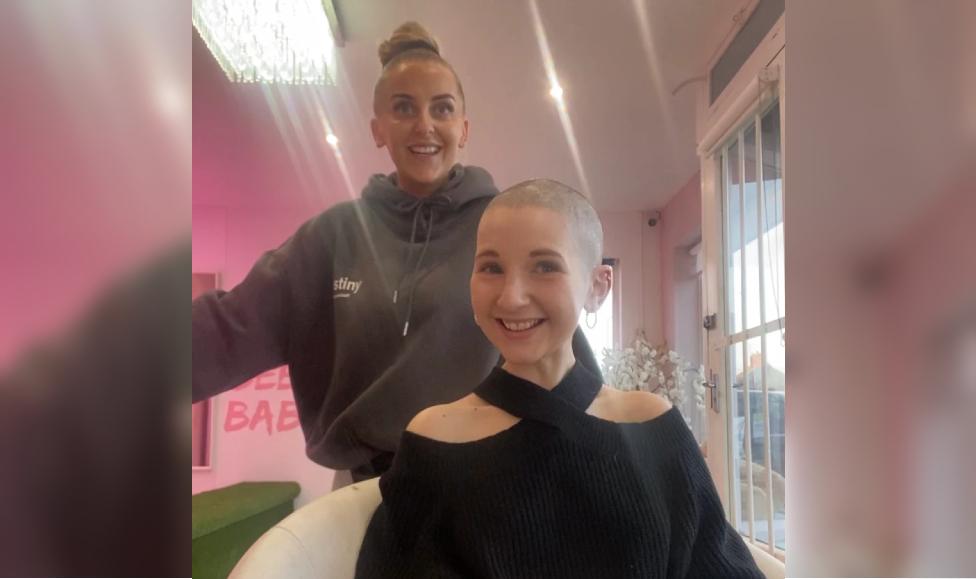
Grace decided to shave her head after two years suffering with alopecia
"It became more damaging to me, mentally, watching it come out in my hands than shave it," she says.
Despite the "instant relief that there was no more itching," Grace couldn't look at herself without a hat on for over a week.
Wearing hats and headscarves compromised her hearing further, however, due to the fabric muffling her hearing aids.
"It was making my job harder as I couldn't hear the children [at school] and it was becoming emotionally tiring."
She now wears a wig, but because the wig hair is thicker than what she is used to, she can sometimes hear rustling when it is next to her ears.
"It took a while to get a wig to fit with my hearing aids and even now it doesn't fit perfectly," she says.
"You are trying to work out whether to put your hearing aids on first, then the wig or vice-versa.
"But I can't be the only one with hearing aids and alopecia."
She hopes to reach out to others with this "unique issue" as she says it can feel very lonely - a feeling she often had while growing up.
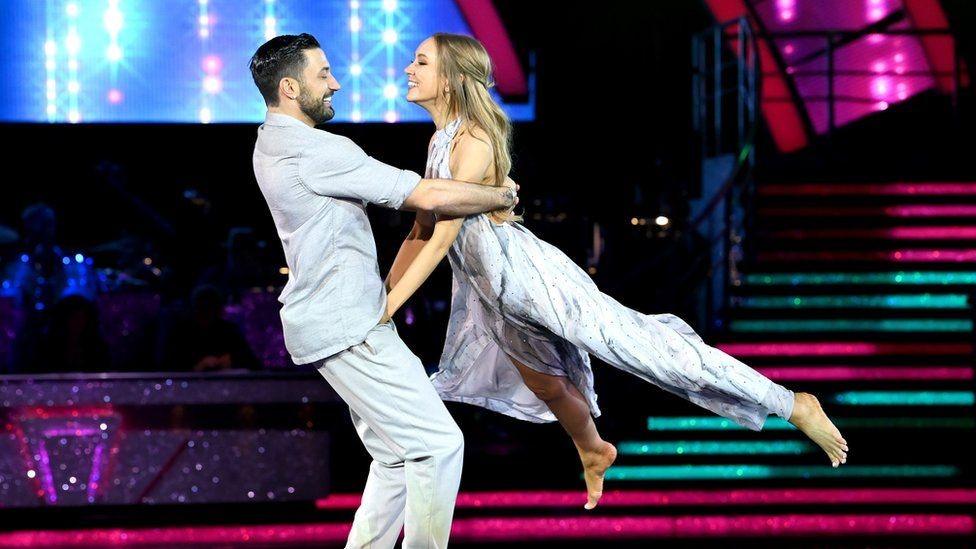
Rose Ayling-Ellis performed a routine with Strictly's Giovanni Pernice during which they paused the music and danced in silence
"Up until the age of ten, I didn't know anyone else with hearing aids," she says.
But while revising for exams in 2020, Grace recalls the moment her mum's voice boomed up the stairs, shouting: "Someone is signing on EastEnders!"
"I thought 'surely not? I bet it's not real sign language'," she says.
But there on the television was actress and Strictly Come Dancing winner Rose Ayling-Ellis playing the part of Frankie Lewis, signing in front of millions of viewers.
"If I had had Rose on TV when I was younger, however selfish this may be, it would have helped me accept myself so much more and I probably would have signed a lot earlier," says Grace.
A feeling a relief came over Grace too when she heard the Strictly winner talking about the vibrations from the music she feels through the floor when she dances.
"I thought, finally! Someone gets what I mean," says Grace, who studied music and drama at A level.
"People say to me, why do you listen to music if you can't hear it? But it's a different experience for me, I can feel it."
One example she gives is Maisie Peters' latest song Cate's Brother.
Allow YouTube content?
This article contains content provided by Google YouTube. We ask for your permission before anything is loaded, as they may be using cookies and other technologies. You may want to read Google’s cookie policy, external and privacy policy, external before accepting. To view this content choose ‘accept and continue’.
"There is a good bass in it and for me, because I feel that bass, I feel the positive energy," says Grace.
Not being able to hear properly has led to her feeling a lack of control of the everyday things.
"My OCD comes from feeling out of control; you can't predict how loud a restaurant will be or where they will sit you," she says.
"I have to take control of situations and on a date once, I booked the cinema tickets just so I could choose where to sit."
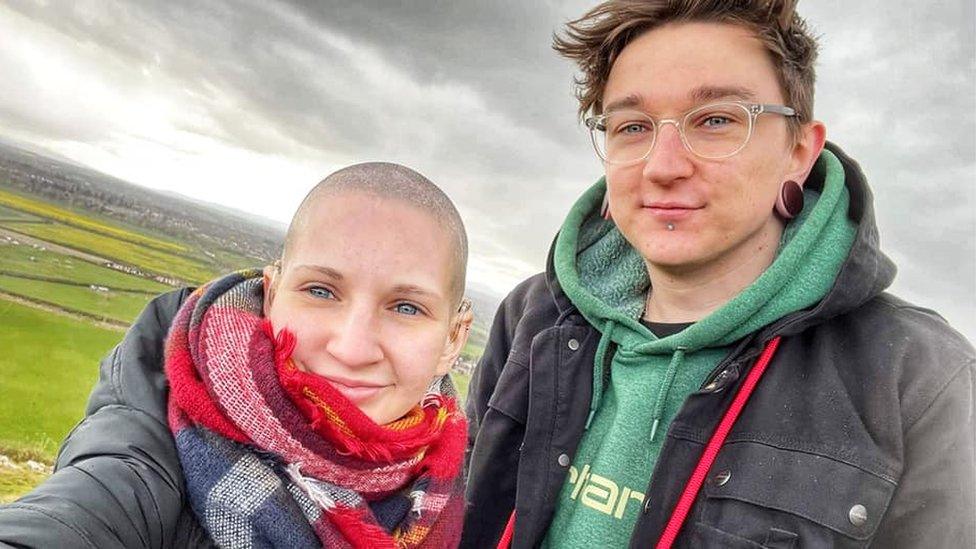
Grace and her partner Elliot Hollis
Last week was Deaf Awareness Week and while Grace says it was great to have it highlighted, she adds: "This isn't something I deal with for just a week, it's every day of my life."
That is where her blog "Hearing Loss - Deaf Gain" comes in, writing about a life with hearing aids and overcoming challenges.
She also has an Instagram account where she shares videos of British Sign Language (BSL).
Allow Instagram content?
This article contains content provided by Instagram. We ask for your permission before anything is loaded, as they may be using cookies and other technologies. You may want to read Meta’s Instagram cookie policy, external and privacy policy, external before accepting. To view this content choose ‘accept and continue’.
Four years ago, she fell into a teaching career quite by chance. The Sensory Inclusion Service in Telford approached her asking if she wanted to mentor a nine-year-old who was deaf and had Cochlear implant, external.
It gave her the confidence to train as a primary school teacher, and through her job wants to bring more awareness to children and young adult with hearing loss.
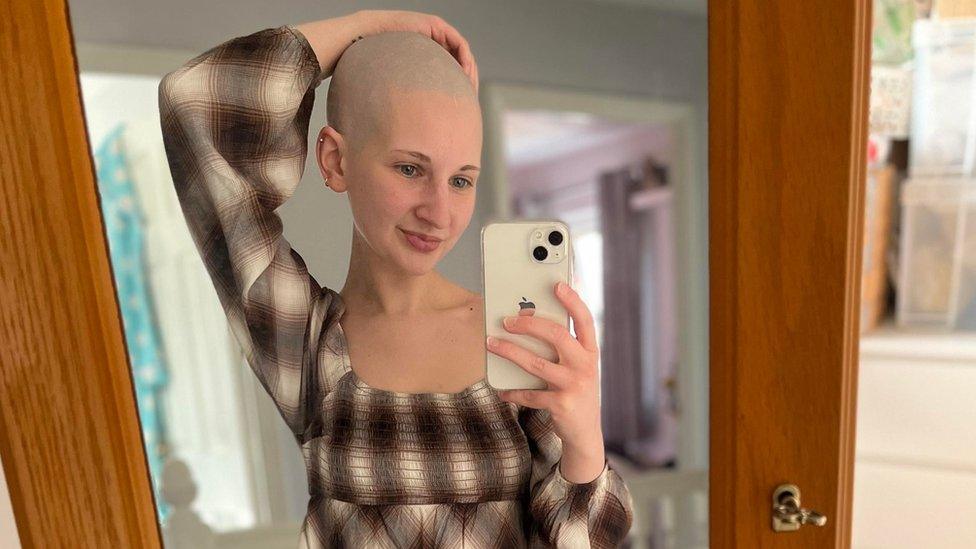
Grace said she is now embracing her new look more
Grace has now started teaching BSL to her students and is setting up an after-school signing club.
She is also pushing for BSL to be taught in all schools. In March 2022, a bill requiring public bodies to promote the BSL as a language was backed by MPs.
Her social media and blog posts now include her experiences as she learns to live with alopecia.
"Writing about my alopecia journey has been in some ways about facing acceptance, the more I hid it, the more alone I felt," she says.
"I'm a big believer in breaking down barriers and adapting to new ways.
"As unique as my combination of barriers and issues may be, I realise I can't be the only person in the world experiencing them."

Follow BBC West Midlands on Facebook, external, Twitter, external and Instagram, external. Send your story ideas to: newsonline.westmidlands@bbc.co.uk, external
Related topics
- Published18 December 2021
